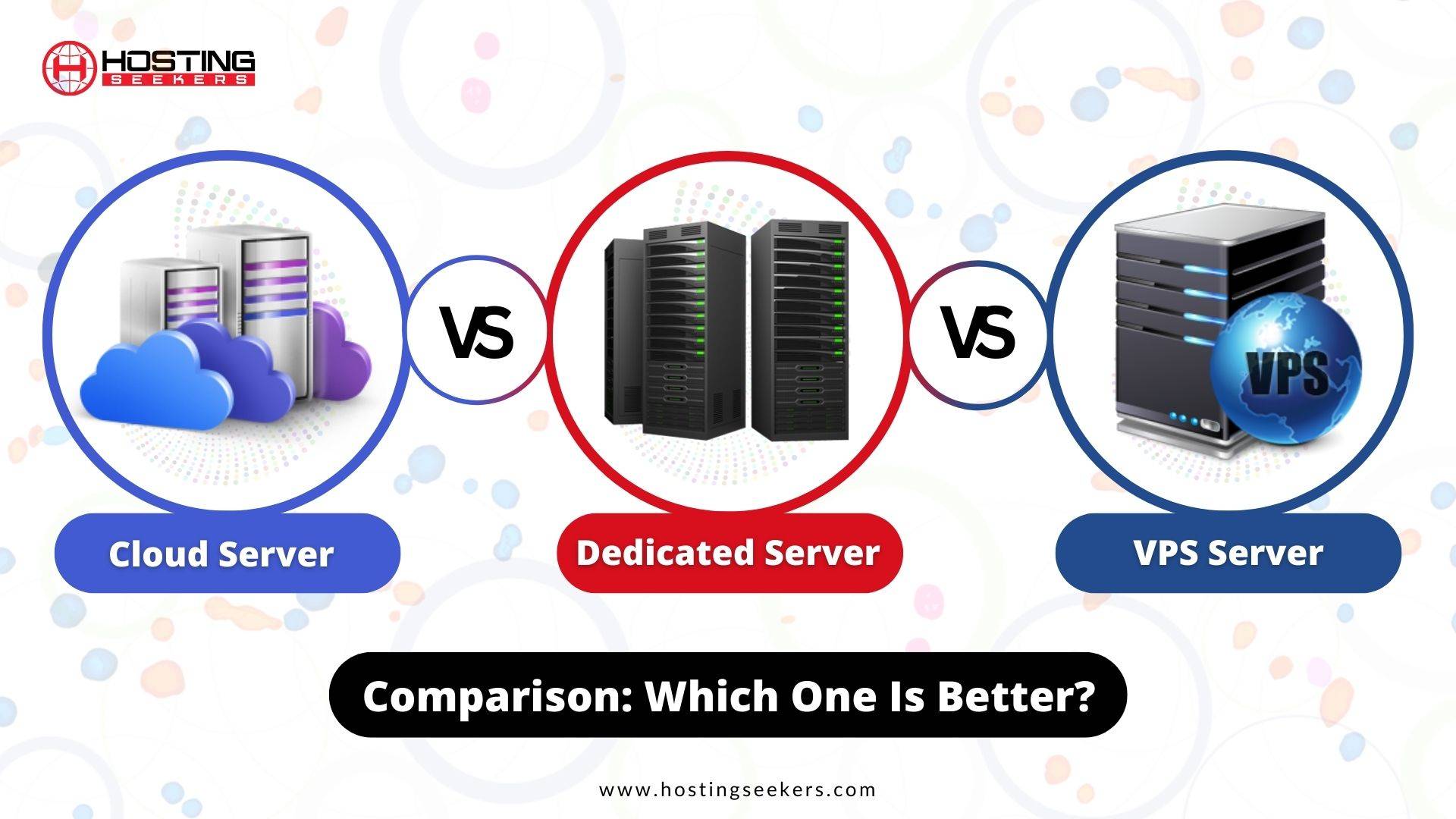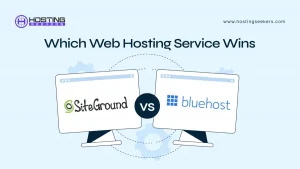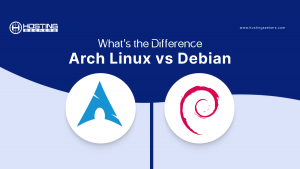
Cloud vs VPS vs Dedicated Server Comparison: Which One Is Better?
Comparison Updated on : December 31, 2024In today’s entirely paced evolving digital landscape, businesses and individuals are constantly changing and seeking reliable and efficient solutions to power their online presence. Among the dozens of options available in the market, three famous choices stand out; Cloud server, Dedicated server, and VPS (Virtual Private Server). Each of these hosting solutions provides its unique set of advantages and caters to specific requirements.
It might be confusing for you to select between Cloud vs VPS vs Dedicated servers, which hosting solution caters best requirements; it’s vital to evaluate various factors like scalability, performance, cost-effectiveness and overall reliability. Don’t worry. We have covered you; this VPS vs Cloud vs Dedicated server comparison guide will help you make informed decisions about the hosting solution that fulfils your specific business demands.
Cloud vs. VPS vs. Dedicated Server: Comparison Chart
| Features | Cloud | VPS | Dedicated |
|
Scalability |
Cloud services provide to scale resources up or down dynamically depending on demand ⭐⭐⭐⭐⭐ (5.0) |
VPS also provides best scalability, but it is more restricted compared to cloud services. ⭐⭐⭐⭐⭐ (5.0) |
Comes with flexibility and high scalability ⭐⭐⭐⭐⭐ (5.0) |
| Performance | Provides high performance and ability to leverage multiple servers ⭐⭐⭐⭐⭐ (5.0) |
Offers balance of performance and also cost effectiveness ⭐⭐⭐⭐ (4.0) |
Highest performance as all the server are dedicated to single customer ⭐⭐⭐⭐⭐ (5.0) |
| Cost | Can be expensive ⭐⭐ (2.0) |
More affordable Solution ⭐⭐⭐ (3.0) |
Higher initial cost ongoing and maintenance expenses ⭐⭐⭐ (3.0) |
| Configuration | Good configurability ⭐⭐⭐⭐ (4.0) |
High configurability ⭐⭐⭐⭐ (4.0) |
Highest Level of Configurability ⭐⭐⭐⭐⭐ (5.0) |
| Pricing (Standard) | $15.99 | $59.99 | $159.99 |
Understanding Cloud vs VPS vs Dedicated Server
Understanding VPS Hosting vs Cloud Hosting vs Dedicated hosting options, their benefits, and drawbacks, and their fundamental characteristics are the first step in determining whether you have the best hosting server for your business. Commonly, there are three types of servers:
I. What Is a Cloud Server?
The first type of hosting is relatively new and is based on the concept of cloud computing technologies, which connect multiple machines to function as a single cohesive system. Cloud computing is expected to reach USD 832.1 billion by 2025, with increased use of cloud hosting contributing to that growth.
In essence, cloud hosting operates in small partitions of multiple servers simultaneously. Consider your website server a hotel or Airbnb where you can jump from one unit to the next and only pay for the one, you’re using rather than renting out multiple places.
You might think, ‘which is better, a cloud hosting server or VPS?’ It all depends on the situation. However, one feature that distinguishes cloud hosting is the ability of multiple servers to collaborate when traffic spikes, reducing the likelihood of glitches or downtime. Of course, servers are still shared, but you can access resources on other servers that may have more capacity.
When comparing cloud hosting vs VPS hosting, dedicated servers are far riskier because they bring your entire system down. Furthermore, having cloud servers becomes advantageous when servers fail. When one of your cloud servers fails, your system can be transferred to another.
Pros of Cloud Server
- Higher reliability as you are now no longer reliant on a single physical server. Your system can move between data centers as needed.
- Flexibility. You can expand your system to accommodate more traffic if you need more space, better performance, or faster speed.
- You only pay for only those resources you use.
Cons of Cloud Server
- Extremely technical, requiring a team of specialists to tweak and maintain.
- Because information is transferred between servers, security is compromised, making it easier for hackers to target your website.
Related Articles:
- What is Cloud Hosting? Here is everything you must know about it
- What is Cloud Hosting? List of Top 10 Cloud Hosting Providers
II. What Is a Dedicated Server?
Dedicated hosting is the next level up from VPS hosting. Unlike shared hosting, dedicated hosting allocates one entire server to your website or group of websites—you have complete access to the infrastructure. In real estate terms, you’ll have the entire townhouse to yourself. As a result, you have complete freedom to customize and tweak as you see fit. You must, however, maintain your virtual estate.
For a good reason, the dedicated server hosting market has been growing at a rate of 5.6% per year. The first reason is that overall business traffic has been increasing, indicating that they are getting more visitors and, most likely, more leads through digital means. The second reason is that small and medium-sized businesses now have greater access to powerful tools such as artificial intelligence-based applications, automation, and other valuable services.
Dedicated hosting can be pricey, but you get what you pay for: higher performance, better security, and, in some cases, VIP customer support.
Pros of a Dedicated Server
- You have your dedicated server.
- The speed is relatively better because you can access all of the server resources without sharing them with anyone.
- Your server will have access to all of the customizable settings that your website will require to run more efficiently.
- Servers are custom-built to meet the exact specifications and requirements of the dedicated server owner’s website.
- Better security because you’re the only one on that server and won’t have to worry about traffic spikes from other servers.
- You get more dedicated customer service as you pay for the entire server. Because dedicated server owners are usually on par with business accounts, most web hosting companies will prioritize them.
Cons Of Dedicated Server
- More expensive.
- You’ll need technical team or personnel to maintain and optimize the server. A website is primarily a company’s responsibility, so any website problems or downtimes will necessitate the expertise of a webmaster or developer.
III. What Is a VPS Server?
Virtual private server (VPS) hosting is the second type of web hosting. VPS hosting is shared hosting in which you share a portion of a dedicated server with other “server-mates” or users on the same machine. If hosting were real estate, it would likely be an apartment or condominium complex.
In the same way, a condo owner is responsible for keeping their unit, VPS server owners must maintain their property. It provides baseline resources firmly assured by a provider and a buffer resource if your traffic rises. If an error occurs on a particular server, you will need to fix it.
Pros of VPS Servers
- Getting a VPS server is less expensive than getting a dedicated server or a server in the cloud. You will only have to pay for the amount of space you use.
- It makes things easier and faster because managing and fixing problems is usually easier.
- An excellent alternative for businesses that don’t expect a lot of people to visit their website.
Cons of VPS Servers
- VPS is the least secure way to use the cloud compared to the other options we’ll discuss later.
- Once your website gets more visitors, there will be times when no one is on it. At that point, you will likely need to upgrade.
- Setting up a VPS might be more challenging when it needs to be managed. But VPS hosting is still easier to operate and set up than dedicated hosting.
Related Articles:
- What Is VPS Hosting? Everything You Need To Know And More
- Launch of new Reliable VPS Server Hosting Provider
- Virtual Private Servers: Global Providers, Market Size, Analytical Overview, Growth Factors, Demand, Trends and Forecast to 2030
Cloud vs VPS vs Dedicated Server Comparison: Final Thoughts
Selecting between Cloud vs Virtual Private Server vs Dedicated server entirely depends on your specific requirements. The cloud server provides a balanced solution with good performance and affordability, mainly suitable for medium-sized apps requiring reliable and configurable environments. Also, a Dedicated server provides the highest performance and control and is perfect for resource-intensive apps but can be more expensive. Also, you can summarize and evaluate your budget, workload, and performance requirements in order to select the best options for your business.
Frequently Asked Questions
Q 1: Is a dedicated server better than VPS?
Ans: Choosing between dedicated vs VPS hosting depends on your requirement, well dedicated server is more better than VPS but can be hefty on your pockets, VPS on the other hand is more cost-effective and offer high performance.
Q 2: Which is better, VPS or cloud hosting?
Ans: VPS and cloud hosting both have their own specialties and advantages. Therefore, VPS provides dedicated resources and a stable environment at lower cost, making it more suitable for more workloads.
Q 3: Which is better cloud server’s vs dedicated servers?
Ans: When we compare cloud hosting vs dedicated server, for the businesses who need high scalability, flexibility and reliability cloud servers are most suitable while dedicated servers are good for the applications that need more control and performance.
Q 4: What is the difference between VPS and VPS hosting?
Ans: Well, there’s no difference between VPS and VPS hosting, both are the same and provide the same services i.e. Virtual Private Server Hosting.
Q 5: Why is cloud hosting better?
Ans: Cloud hosting is mainly highly resilient, guarantees good uptime, and reduces delays as compared to traditional hosting options. Also, this makes it ideal for businesses with fluctuating workloads and high availability.




